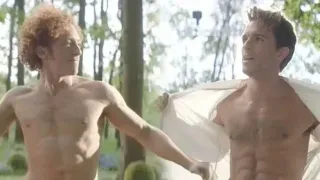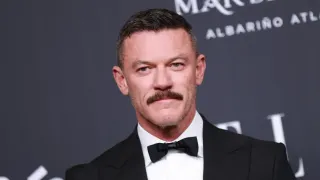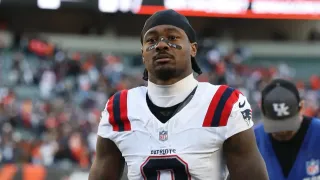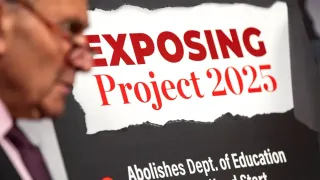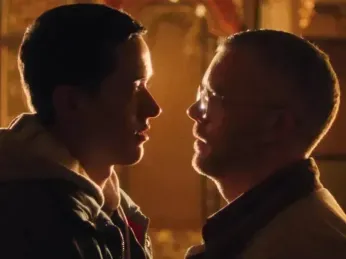
Sep 28
‘Plainclothes’ writer/director Carmen Emmi discusses his ’90s-set story of repression and self-discovery
Brian Bromberger READ TIME: 2 MIN.
After having screened successfully at Frameline49, the new indie tense psychological thriller, “Plainclothes” played at this year’s Sundance Film Festival and won the U.S. Dramatic Special Jury Award for the Ensemble Cast. At the Provincetown Film Festival, it was voted the Audience Award for Best Film. It was not only one of my favorite films at Frameline, but is still one of the best gay films of the year.
It’s a period piece, based on the director’s memories of the culture at the time. Set in 1997 in upstate Syracuse, New York, Lucas (Tom Blyth) is a young closeted gay cop assigned to a special task force on undercover “plainclothes” duty at the bathroom of the local mall, a well-known gay hook-up site. The police cruise and entrap gay men, getting them to expose themselves and then arrest them for lewd conduct.
He falls for one of his marks, the older, attractive Andrew (Russell Tovey), whom he lets go free. Andrew is also closeted and married with children. There’s a shocker when Lucas discovers what he does for a living. They meet in theaters and greenhouses for sex, despite Andrew having a strict rule about not engaging with a guy more than once. Andrew is falling in love with Andrew, but can’t tell his mother, with whom he lives, or his family. He’s torn between duty and desire. All these tensions will culminate at his mother’s New Year’s Eve, the first one since his father died earlier in the year.
I met with debut gay writer/director Carmen Emmi at the Hilton Hotel in June when he was in town for Frameline to discuss “Plainclothes.”
Shaping expectations
Emmi has been interested in making films since he got his first Hi8 camera at age 10 and created short films in high school. He couldn’t picture himself doing anything else. He attended USC’s School of Cinematic Arts and realized he wanted to direct, but knew he would have to write something in order for that to happen.
“I had come out in 2014 and I knew my movie would center on my feelings on coming out and what that time was like when I was a boy,” said Emmi. “I remembered deepening my voice, lying about my favorite music and movies to appear more masculine, more straight. I realized that, shaped by societal expectations of what a man should be, I suppressed my feelings and became my own harshest enforcer. In the 1990s, being gay felt like a death sentence, amplified by the pervasive fear of AIDS.”
Emmi’s brother was becoming a police officer and acquainted him with that world.
“I read an article in the Los Angeles Times about undercover police officers arresting men as part of a sting operation in a park bathroom in 2014, shortly after I was beginning to live openly as a gay man,” said Emmi. “I was shocked, as I believed it was now safe to come out in our culture, yet I didn’t feel that way anymore. I had spent so many years trying to stay safe before anyone could ask about who I really was. It forced me to confront the reasons I had closeted myself for so long, bringing up those feelings I experienced as a boy.
“Based on a true story, I wanted my film to explore what it means to police your feelings, to hold back one’s true self, or hide in plain sight and how that can alter your mind from living that way. It’s a quiet internal struggle that can happen whether you’re queer or not. That anxiety builds over time and I wanted to explore where it went.”
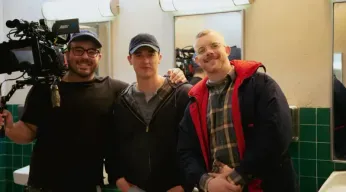
Tales of a city
Setting the story in Syracuse was something Emmi felt he had to do.
“I wanted to honor the place that raised me, even if I hadn’t always felt I belonged,” said Emmi. “It’s also where L. Frank Baum spent time as a boy and young adult. He wrote ‘The Wizard of Oz,’ which is my favorite movie. I’d like to think when he saw downtown Syracuse, that was the inspiration for the Emerald City. There was also a professor who launched a hot air balloon in downtown Syracuse. My imagination always ran wild there since it was a very safe and beautiful place to create. However, I never felt Syracuse was gay friendly. I read ‘And the Band Played On’ after my first draft of ‘Plainclothes,’ so I knew what a traumatic time it was for gay men. It rippled up to Syracuse from New York City, so being gay in my mind was scary.”
Emmi also decided to use his first Hi8 camera as a way of weaving his memories into Lucas’s anxieties.
“My editor, Erik Vogt-Nilsen and I intersected this Hi8 footage –most of which was shot on-set between takes– into the final cut to represent Lucas’s inner thoughts: what he sees and what he believes he sees,” said Emmi. “Using that camera quickly put me into that time period. I used footage from my own family archives in the movie. There was a Danish movie years ago, ‘Celebration,’ that was filmed using mini DV, part of the filmmaking called Dogma95, which inspired me in ‘Plainclothes.’”
Emmi still meets people who are closeted today, but added, “I’m excited for the future, because men who are straight and watched my film, opened up to me how they wish they had experimented with men or had permission to do so, when they were younger, as opposed to what they were taught as boys in our culture concerning what it means to be a man. This causes suppression.”
As for casting, Emmi was unfamiliar with Blyth’s work, but he had sent the script to the same agency which manages Blyth. After reading his script, a woman there suggested he consider him for Lucas.
“I saw the movie ‘Hunger Games: The Ballad of Songbirds & Snakes,’ in which he appeared, and was struck by his expressive eyes,” said Emmi. “Several well-known actors had turned it down including the one for whom I had specifically written the screenplay. I visited Tom on his ‘Billy the Kid’ set. I saw how he interacted with his team. It was a positive environment and I knew it was due to him. I was glad when he said yes after reading the script.”
Emmi had seen Russell Tovey in a streaming production of “Angels in America,” in which he played gay lawyer Joe Pitt.
“I had a talent crush on him after ‘Looking’ and maybe subconsciously I was writing the role for Russell, Emmi admitted. “‘Looking’ meant a great deal to me as it was pivotal in my coming out. ‘Looking’ helped me see a future for myself, what my life could be like as an out man. I was nervous to ask Russell if he would play Andrew because I didn’t want him to say no, then I would never be able to watch ‘Looking’ again. Fortunately he loved the character.”
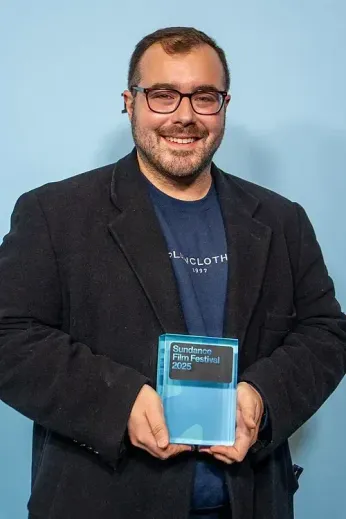
Who plays gay?
Emmi was very happy with the sizzling chemistry between Blyth and Tovey.
“It was electric on set,” he said. “Tovey is gay and Tom is open. I don’t think he’s identified one way or another. What’s so great about this younger generation is their fluidity. But while it’s easier for many gay people to come out now, I still feel we have a lot of boxes to dismantle within our community.”
Does Emmi feel only LGBTQ actors should play queer roles?
“I’m the writer and director of my movie and I’m gay, so I can pick who I want to play in the film,” he said. “It was really important for me to look at queer actors. I’m really thrilled Russell is in the movie, since he’s so out and proud. Yet it was also important to me to find theater-trained actors. Tom went to Julliard, but I didn’t want to ask him about his sexuality in a casting call. If we get too rigid with rules about who plays what roles, it can stifle creativity. I would cast the same actors again. Even if it was a straight actor, it would be okay because he was living out my experience as a queer man.”
The queer films that made an impact on Emmi were “Boys Don’t Cry,” “Monster,” “Closet Monster,” and “Brokeback Mountain.”
“I distanced myself from it because I was so scared about being gay as a teen, but I saw it again a few years ago and loved it,” said Emmi. “I think queer films should be message-oriented, yet I also feel they don’t have to be. It’s whatever creative energy as a filmmaker inspires you.
“It’s more important than ever to keep making queer content, to keep being visible, that we do exist and matter, he continued. “My family is supportive and gives me excellent feedback on my work. I’m inspired by books (I’m reading ‘Gay Bar’ and want to revisit ‘Maurice.’) and music, which is how I stay grounded. I played it on the set to help actors drop into character.”
It can be very challenging to make an indie film today, especially in securing funding.
“I was very lucky,” said Emmi. “My college roommate, Alessandra Ford-Balazs, who appears in the film as Lucas’s brother’s girlfriend, introduced me to her boyfriend, later husband, producer Arthur Landon, who after reading my script agreed to finance it. He was on set all 18 days of the shoot, but I never felt he was hovering over me. Syracuse rallying behind the project was a dream. Their enthusiasm and support made the entire process unforgettable as they embraced our work. The one disappointment was losing a key location, a place I had spent a lot of time in while growing up, around which I developed the film, but was denied permission to film there. I had to rethink the visuals I had planned for years.”
Emmi says the message of the film is not to suppress your feelings or acknowledge if you are doing so, but to love each other. He wished he had seen a film like “Plainclothes” when he was growing up.
“I made this film so that my seven-year-old self could exhale. I made it for the countless people –queer and non-queer alike– who hold their true selves back. I made it because of a familiar image that resurfaced while I was writing: a kid in the grocery line watching their mom turn over a magazine to hide the cast of ‘Queer Eye for the Straight Guy.’ That kid can’t watch this movie, but they can watch me turn the magazine back around. I wanted to leave the audience with a feeling of hope, maybe for someone who was struggling with not even their sexuality, but any secret they had. That was the goal for me.”
'Plainclothes' opens Oct. 3 at Apple Cinemas, 1000 Van Ness Ave., San Francisco
and Rialto Cinemas Sebastopol, Sebastopol.
‘Plainclothes’ opens Oct. 19 at Landmark Opera Plaza.
https://www.magpictures.com/plainclothes/
